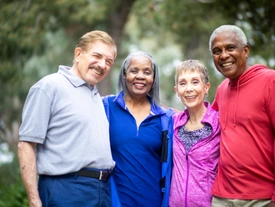What You Can Do As A Senior Citizen In The United States
Senior citizens in the United States face unique opportunities and challenges. Access to reliable information and resources makes it easier to maintain independence, health, and financial stability. Let’s explore how seniors can feel empowered by learning to tackle daily challenges, including their healthcare options, opportunities for financial assistance, and strategies for staying socially connected.
Understanding The Needs Of Senior Citizens
Aging presents unique challenges that can significantly impact daily life. Seniors who learn to tackle these issues can maintain a good quality of life. Health concerns, mobility issues, and financial stability are common hurdles that necessitate thoughtful planning to enable seniors to live fulfilling lives.
Health is often a primary concern. Conditions like arthritis, diabetes, and heart disease can limit daily activities. Regular check-ups and access to healthcare can help people manage these conditions.
Mobility can also become a challenge. Changes in physical ability might make it harder to move around safely, which can impact social engagement and independence.
Financial stability can also be difficult to control. Many seniors live on fixed incomes, which can be challenging to manage in light of rising healthcare and living costs. Smart financial planning and assistance programs can ease these pressures.
By recognizing challenges and finding the right resources, seniors can take steps to overcome obstacles and enjoy a more independent lifestyle.
Health And Wellness Resources For Seniors

Seniors who want to enjoy an active lifestyle are wise to focus on staying healthy. As we age, managing chronic conditions and preventing new health issues becomes more important. Fortunately, the U.S. offers a range of healthcare services specifically designed for seniors.
Accessing Healthcare Services
Medicare and Medicaid are two main programs that provide essential coverage for seniors. Medicare serves those 65 and older by covering hospital stays, medical visits, and prescriptions. Medicaid helps low-income seniors with costs not covered by Medicare, like long-term care.
Choosing healthcare providers is important, too. Seniors should think about location, accessibility, and the provider’s experience with older patients. Reviewing healthcare plans during open enrollment is a great way to make sure they meet evolving health needs.
Promoting Physical And Mental Well-being
Physical activity, such as walking or yoga, helps maintain mobility and balance, which in turn reduces fall risks. Mental activities, such as completing puzzles or reading, help keep the mind sharp. Many communities offer senior centers and wellness programs that provide opportunities for physical and mental activities to promote health and encourage social interaction.
By tapping into these resources, seniors can actively manage their health, resulting in a better quality of life and increased independence.
Financial Planning And Assistance For Seniors
A solid financial plan can make sure you have a comfortable retirement. As seniors leave the workforce, managing finances becomes a crucial factor in maintaining a quality of life amid rising costs.
Retirement Planning And Savings
Retirement planning starts with assessing your financial situation and setting achievable goals. Evaluate your savings to determine if they align with your retirement goals. Consider your living expenses, healthcare, and leisure activities. Financial advisors can provide tailored advice by guiding you through investment choices and optimizing your retirement funds. Community workshops on financial literacy also offer practical tips on managing savings and investments.
Assistance Programs And Benefits
Seniors who require additional financial assistance can utilize government programs, such as Social Security. They provide monthly benefits to cover basic expenses. Knowing when to start collecting these benefits can make a big difference in your financial health. Supplemental Security Income (SSI) is available for seniors with limited income to help them meet essential needs. To apply, you must understand the eligibility requirements and complete the necessary paperwork, which can be done at a local Social Security office or online.
By leveraging these resources and programs, seniors can better manage their finances, reduce stress, and enjoy their retirement years to the fullest.
Housing And Living Options For Seniors

Seniors have several housing options that offer varying levels of support and community involvement. Knowing these choices helps seniors align their living arrangements with personal preferences and health needs.
Aging In Place
Staying in your own home, also known as "aging in place," is a popular choice for many seniors who value independence and familiarity. To ensure safety, home modifications might be necessary. Simple changes like adding grab bars in bathrooms, installing additional lighting, and removing tripping hazards can significantly improve safety. Local government programs and nonprofits often provide financial aid or volunteer services to help with these modifications.
Senior Living Communities
Senior living communities offer options for individuals seeking more community interaction or requiring additional support. Independent living communities cater to active seniors by providing a social environment with minimal assistance. Assisted living facilities provide more comprehensive support to help with daily activities, such as bathing and medication management, while still encouraging independence.
When selecting a senior living community, consider factors such as location, cost, services, and the community's overall atmosphere. Visit each facility, speak with residents and staff, and review contracts to find the best fit for your individual needs and preferences.
By exploring these housing options, seniors can find a living arrangement that impacts their health, happiness, and well-being.
Staying Connected: Social And Community Engagement
Seniors rely on social connections to combat loneliness and isolation. Engaging with others can significantly boost mental and emotional health. Fortunately, there are many ways for seniors to stay active and involved in their communities.
Volunteering And Hobbies
Volunteering offers seniors a chance to contribute their skills and experience while gaining a sense of purpose. Opportunities such as mentoring young people or participating in local clean-up efforts are available throughout each community. Many organizations actively seek senior volunteers for their unique insights. Hobbies like gardening, painting, or joining a book club can also provide creative outlets for seniors.
Technology And Communication
Technology helps bridge the gap when physical distance separates loved ones. Learning to use social media or video calling apps like Zoom can keep seniors connected with family and friends. Community centers and libraries often offer workshops to help seniors become comfortable with digital tools, enabling them to use them safely and effectively. Embracing technology fosters connections and unlocks new avenues for information and entertainment.
Conclusion
Accessing the right resources is necessary for seniors in the United States to lead fulfilling lives. By addressing their unique needs, seniors can maintain health, financial stability, and social connections. Luckily, there is a wealth of available resources. Encouraging seniors to utilize these resources empowers them to enjoy a higher quality of life, fosters independence, and promotes happiness in their golden years.






















